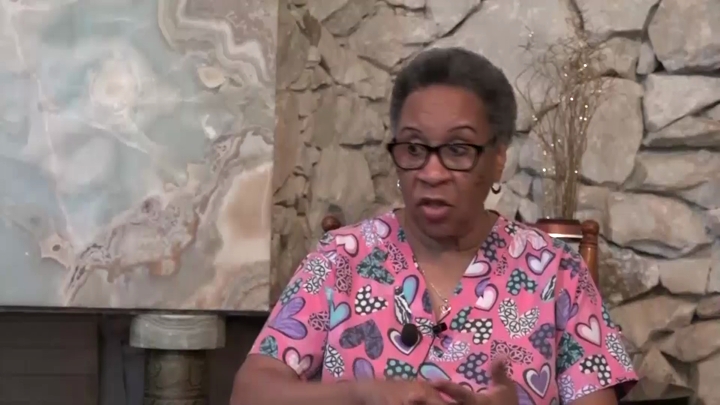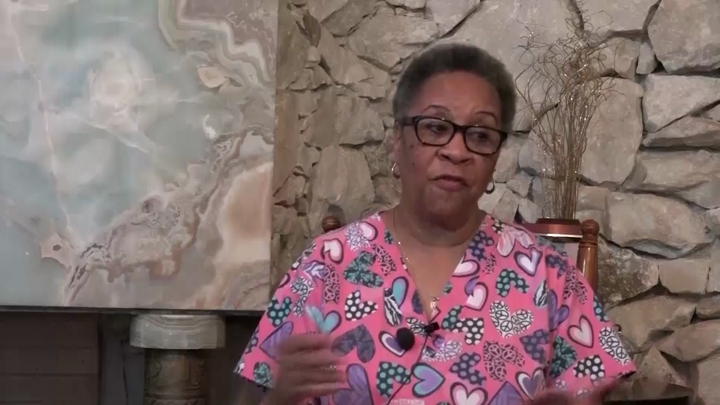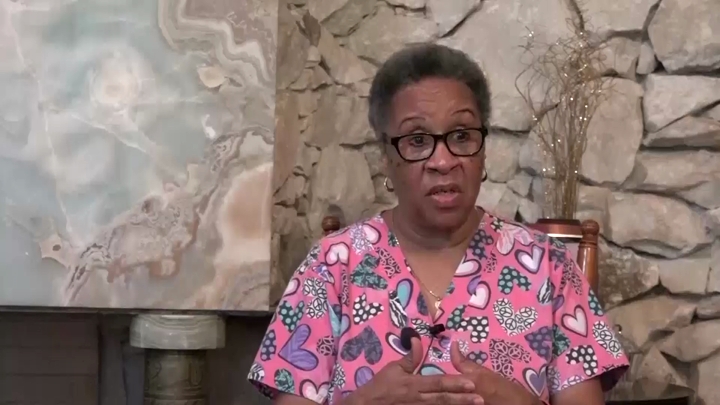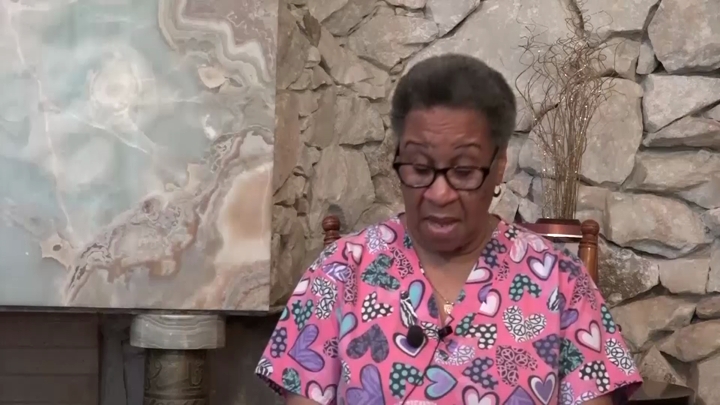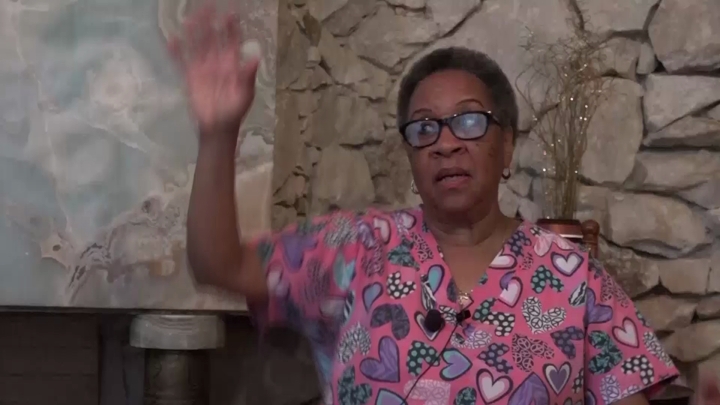Abdullah / Arrest of Black SFA Student
sign up or sign in to add/edit transcript
Interviewer: You mentioned someone being arrested and that— Helena Abdullah: Cubie Dorsey. Interviewer: Can you describe that incident? Helena Abdullah: From what we know, Cubie Dorsey was a student up at SFA, too. She was from maybe Kilgore or some place like that. From my understanding, she had written some hot checks. There was some checks that bounced and didn't have the money to pay for the checks. So, they had picked her up and arrested her. That had never happened before. Usually, you would contact the student's parents, the parent's pay the money. It's an over and done situation. She was arrested. When she was arrested, she wasn't given due process and that's when, if I'm not mistaken, someone called Mr. Weaver. He wasn't allowed to go in and talk to her. So, in the old jail where the old courthouse is, they house people upstairs, so we had to stand across the street and talk to Cubie through the windows. She had not been given a lawyer, she had not been given anything and when they interviewed her she was interviewed without a lawyer. So that's when—this was I want to say the second march because that's when stuff broke loose downtown. Because something happened when she was arrested. Maybe she was roughed up a little bit. Not too too bad, but you know, they didn't treat her. She was nineteen, twenty years old and this is one harsh town. That started then because the treatment that she was getting. She was not getting due process. Once however was with her at first got ahold of Mr. Weaver and then Mr. Weaver got involved in it and that's when it got a lot bigger than just Cubie. It kind of spilled out into other things that the police department and the sheriff's department was and was not doing that were correct. People started coming out the woodwork saying this is happening and that's happening. They didn't do this, and they did this to that person and they did that to that one. Mr. Weaver had a bunch of horror stories. Interviewer: People felt more comfortable telling their story when that incident happened? Helena Abdullah: Because they knew they were going to have the support of a community too. We had already had one successful march and then we were already in the middle of the boycott. We were in the middle of the second march. So, people started talking more about what needed to be done around here and what changes needed to be made. Interviewer: And so, the second march happened, and I think you said that the people that participated increased for the second march? Helena Abdullah: Yeah Interviewer: Do you think that was because of people's other personal experiences dealing with those injustices? Helena Abdullah: We had a lot more youth in the second march which is why it was more dangerous because when somebody got wind that they had roughed up someone downtown. Well, some boys that I knew had gotten some Molotov cocktails. That's the little kerosene in a bottle and you light it. Well they threw it into—well this man whose store they threw it—everybody knew he was a racist. His store's right at the edge of the black community. They through some Molotov cocktails into his store just as the tail end of the crowd was getting into downtown. Well, by the time we got into downtown, some other things were going on. People started throwing rocks, young people. They didn't have a clue as to what we were trying to get accomplish. They were just hotheaded kids. We want some change. We want something done. Damn the white man, you know. This kind of stuff. It really made for a bad situation. People could have gotten really hurt. Thankfully the police department didn't have any reinforcements so everybody just kind of, when we got into the middle of downtown, we kind of started dispersing. Some people were picked up and taken to jail. That's when I got on the phone because we used to have phones everywhere. I got on the phone and started calling Dallas to get people down here because they arrested Mickey right off the streets. They arrested him for inciting a riot. Interviewer: How did you know to call people in Dallas? Helena Abdullah: Mickey had given me the numbers. He had given me the numbers because I was the contact person. I was the liaison, pretty much, between him and everybody else. Not the important person but just a liaison. So, he gave me the numbers just in case something happened. He told me that when we first started. He said look Miss Patton if something happens you need to call, I forgot the guys name out of Dallas, if they arrest me you call these numbers and that's exactly what I did. Interviewer: Do you think he was part of it? Helena Abdullah: Of course. They got him for inciting a riot. They had heard him speak up at SFA and then because we started meeting at SFA out in the yard because we didn't have any place to meet. So, people were hearing what he was saying, and he was telling us to mobilize. Get your mobilization together, get your key people in place because you're going to have to effect some change and it's going to take another march and it's going to take a boycott. So, all of that culminated in making change. Interviewer: With the history of Nacogdoches law enforcement roughing up people, was Mr. McGuire roughed up? Helena Abdullah: At first, he thought he was going to do a lawsuit against them, but I think he decided not to. He wasn't beaten up beaten up. Just roughed up. They didn't gingerly may I have your hand to put this handcuff on? Yanking and slapping them on, throwing them in the car. That kind of thing. It wasn't too totally bad bad so I think he decided not to. He had said the he probably would when he got out. It was some days before we could get him out. Interviewer: I think there was some kind of lawsuit because there is a McGuire vs. Roebuck. Helena Abdullah: That was it then, because he said—I thought he had dropped that but. Interviewer: How many people would you say were arrested at the second march? After the second march? Helena Abdullah: Probably ten. Interviewer: What was the community's response to that march? Helena Abdullah: The older people got mad because they thought the kids overreacted and they shouldn't have tried to burn down somebody's building. Mr. Weaver was against the violence and we were against the violence. We didn't want any of that. It's just we got some hothead kids. I didn't even know they had the Molotov cocktails. They were on the tail-end of the march. Interviewer: Were the kids SFA students or were they high school students? Helena Abdullah: I think it may have been a mix but some of them were from the high school, from our community.
| Interview | Interview with Helena Abdullah |
| Subjects | Police and Law Enforcement |
| Police and Law Enforcement › Police Brutality | |
| Police and Law Enforcement › Jails | |
| Direct Action | |
| Direct Action › Marches | |
| Student Activism | |
| Direct Action › Protests | |
| Tags | McGuire, Mickey |
| Stephen F. Austin State University | |
| Weaver, Arthur | |
| sign up or sign in to add/edit tags | |
| Interview date | 2016-06-30 |
| Interview source | CRBB Summer 2016 |
| Interviewees | Abdullah, Helena |
| Interviewers | Howard, Jasmin |
| Locations | Kilgore, TX |
| Nacogdoches, TX | |
| Duration | 00:06:49 |
| Citation | "Arrest of Black SFA Student," from Helena Abdullah oral history interview with Jasmin Howard, June 30, 2016, Nacogdoches, TX, Civil Rights in Black and Brown Interview Database, https://crbb.tcu.edu/clips/2441/arrest-of-black-sfa-student, accessed March 01, 2026 |


